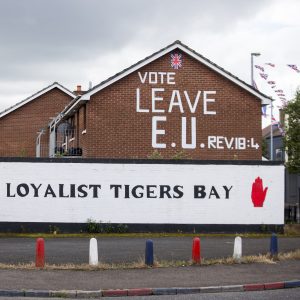The UK’s decision to leave the European Union will have political, economic and social ramifications for the island of Ireland and has already sparked calls from Sinn Fein for a border poll on a united Ireland.
Of Northern Ireland’s 18 constituencies, 11 voted Remain and seven voted Leave, totalling 440,707 votes (56 per cent) in support of staying in the EU and 349,442 (44 per cent) to Leave. Overall turnout for Northern Ireland stood at 62.69 per cent.
Stormont Deputy First Minister, Sinn Féin’s Martin McGuinness, responded to the wider UK result to Leave negatively, saying it was at odds with the sentiment in Northern Ireland.
“This decision to drag us out of the European Union against our democratically expressed wishes has nothing to do with issues around the European institutions and everything to do with the civil war within the British Tory party,” he said. He added that the people of Northern Ireland had made it clear at the polls that they wished to remain in the EU.
Sinn Fein believe a border poll is now justified as the UK no longer has a mandate to govern Northern Ireland. There are also questions over whether the referendum vote could derail the peace process. The Good Friday Agreement was negotiated in the context of Ireland’s, Britain’s and Northern Ireland’s membership of EU and the devolution arrangements for Northern Ireland give primacy to European law.
Speaking to RTE Radio 1’s Today with Sean O’Rourke, Sinn Fein leader Gerry Adams called on the Irish government to defend all aspects of Good Friday Agreement and added, “We cannot have border posts coming back.... they would be detrimental”.
However, the Eurosceptic Democratic Unionists (DUP) said the vote would deliver a bright future for Northern Ireland as part of an unshackled UK. South of the border the result saw many of Ireland's largest companies’ share prices plummet. The Irish stock market was down 13 per cent.
The latest government analysis (the Summer Economic Statement) suggested that Brexit could potentially knock between €1.1 billion and €2.7 billion off GDP.
The UK is Ireland’s second largest trading partner. Some 16% of exports go to the UK, including 52 per cent of Irish beef and 60 per cent of cheese. Brexit could likely throw this relationship into turmoil.
There remains uncertainty over the impact of the vote on the border between Ireland and Northern Ireland. Customs checks existed between the two countries until 1993 when they were abolished under European Community rules. Custom checks and tariffs could be reinstated.
A common travel area has existed between Ireland and the UK since the 1920s allowing people to travel between both regions without a passport. There is concern that this will also be put in jeopardy following the referendum result.
In a statement after an emergency Cabinet meeting this morning, the Taoiseach Enda Kenny said that while the decision of the British people would be fully respected he was sorry about the outcome.
He assured the Irish public that the Government has a detailed contingency plan ready and it will publish a summary of key actions which it will now take to address the contingencies arising from the UK electorate’s decision.
“The implications of this vote for Northern Ireland and for relations between the North and South of this island will require careful consideration and this will be of particular priority for the government,” Mr Kenny said on Friday noon.
In the medium term, he highlighted a concern over the Common travel area between Britain and Ireland and said his government would do their utmost to maintain the common travel area and to minimise any possible disruptions to the flow of people, goods and services between these islands. He added that he was “acutely aware” of the concerns that will be felt by the many thousands of people within Irish community in Britain.
As of Friday lunchtime, the only religious leader in Ireland to respond to the vote was Archbishop Michael Jackson, the Primate of the Southern Province of the Church of Ireland.
“At this time of considerable uncertainty for the people of Ireland following the outcome of the referendum on continuing EU membership in the United Kingdom, our hopes and prayers are for stability and clarity in finding the best path forward. Many people in Ireland fear the impact that this momentous decision will have on their lives in ways that are still incalculable and unknown.”
Just ahead of the vote, Bishop Donal McKeown of Derry had warned, “We may be facing a period of renewed nationalism, as well as strident regionalism” within some states in Europe. He added, “Our individual churches are not just concerned with saving souls but also with saving Europe from its worst self-destructive inclinations.”
Former Taoiseach and EU ambassador to Washington, John Bruton, described the vote outcome as a psychological blow to many Irish people who have recently emigrated to Britain. He also criticised those in England “who actually want the European Union to fail” out of schadenfreude that the misfortune of their neighbours will make them feel better about themselves.
Dismayed European churches send warning to Brussels - all the best analysis in The Tablet newspaper this week




 Loading ...
Loading ...